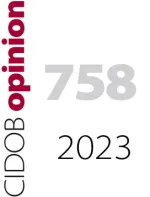Responsibilities after the shipwreck

Since 2014 over 24.000 people have died attempting to reach Europe by crossing the Mediterranean. The images and lamentations that follow have become repetitive. And yet the narrative and response have changed. Europe no longer wants refugees and, if it agrees on anything, it agrees on tighter border control.
* This article was previously published in El País.
Europe is still being shaken by the deaths of migrants in the Mediterranean. Once again, images reach us of bodies lying on beaches and dozens of lined-up unnamed coffins. October 2013 was the first, when 366 people drowned shortly before reaching Lampedusa. Last February 26th was the most recent, when 67 people died and countless others disappeared off the coast of Calabria. The images always bring official statements lamenting the deaths, and most also speak of responsibilities.
The feeling may be one of déjà vu, but in fact the narrative has changed. Today, nobody would think of issuing a mea culpa, as Cecilia Malmström did in 2015, saying that “this is not the Europe we want”. Also out of the question now are responses that include increasing “search and rescue” operations, as Italy did in 2013. The main point of consensus in the official discourse is that the traffickers are to blame and the best way to “save lives” is by stopping people leaving. The more inhumane and brutal the traffickers are made out to be, the more humane and innocent Europe’s borders are made to appear.
Italy’s role is another thing that has changed since 2015. Back then, Rome blamed the European Union for not supporting its rescue missions; now the EU blames Giorgia Meloni’s Italian government for its policy of criminalising rescue NGOs. This is not a trivial accusation: last February, the Italian government approved a decree that hinders NGOs’ rescue work, obliging them to disembark after the first rescue and in distant ports. The European Commission’s spokesperson on home affairs, migration and internal security reminded Italy that the decree must “respect the international laws and the law of the sea”.
Blaming Italy is now a strategy that is used repeatedly, but it ignores other facts. For example, it was the United Kingdom that opposed a European rescue mission in 2014, arguing that it would have a pull effect and would encourage migrants to risk their lives. Meanwhile, since 2018 Spain, as well as Italy, has reduced maritime rescue missions at the same time as increased resources have been given to the coastguards of southern Mediterranean countries. Then there is the fact that France, which presents itself as the antithesis of Meloni’s policies, has also ignored appeals for help in the Channel, most notably in November 2021, when 27 people ended up dying.
Nevertheless, European responsibility goes beyond scaling back rescue operations. Europe doesn’t want refugees anymore and to achieve this, if it agrees on anything, it agrees on tighter border controls. Member states have put up 1,700 kilometres of fencing over the past eight years. They have also been militarising the external borders. We need only think back to the state of emergency on Poland’s border with Belarus, the Greek army’s actions at the river Evros, and the illegal but now normalised practice of “hot returns” in the Aegean. All of this ignores the fact that borders become less effective as the need to migrate increases (think of Afghans, Syrians, Iranians).
Given this context, it should come as no surprise that the EU and its member states have resorted to seeking support from neighbouring countries. However, there are two major problems with this policy of outsourcing migration control. First, no matter how rigid, control from the outside is worthless if the situation within countries becomes unsustainable. It is worth recalling that the latest vessel came from Turkey, where merely surviving is a challenge for many refugees. Second, governments from neighbouring countries do not necessarily fulfil their role as border guards, and when they do it always comes at a price.
Following the most recent shipwreck in Calabria, European Commission President Ursula von der Leyen stated the need to “redouble our efforts”. More déjà vu. It is as if words have been definitively dissociated from reality. On the one hand, the words lament the deaths, name the guilty parties and appeal for the necessary new policies. On the other, reality barges in when extreme situations like those in Syria and Afghanistan and regions like the Sahel reach our doorsteps, and when Europe, faced with them, fails to shake off its paralysis and opts to continue with policies that do not work and that rely on third countries rather than finding agreement and addressing the issue.
Because if anything has become clear over all these years it is that the solution must involve countries of origin and transit and, where there is no alternative to flight, the solution must involve opening up safe, legal routes to ensure international protection is a genuine right. Otherwise, more irregular arrivals and deaths will come, as will the strengthening of the illiberal shift in European migration and asylum policy.
Keywords: migration, refugees, EU, Italy, Mediterranean, narratives, trafficking, rescue mission, Greece, borders, asylum